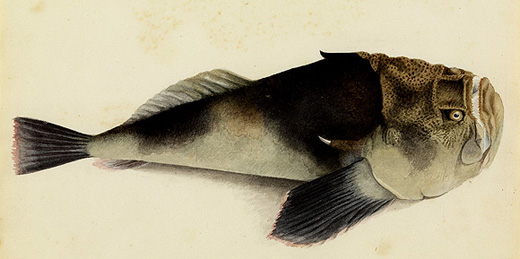Elizabeth Bishop (1911 – 1979)

his brown skin hung in strips
like ancient wallpaper
I caught a tremendous fish
and held him beside the boat
half out of water, with my hook
fast in a corner of his mouth.
He didn't fight.
He hadn't fought at all.
He hung a grunting weight,
battered andHow do the phrases "battered and venerable" and "strips like ancient wallpaper" relate to and play off of each other? venerableworthy of respect due to great age or dignity of status
and homely. Here and there
his brown skin hung in strips
like ancient wallpaper,How do the phrases "battered and venerable" and "strips like ancient wallpaper" relate to and play off of each other?
and its pattern of darker brown
was like wallpaper:
shapes like full-blown roses
stained and lost through age.
He was speckled with barnacles,
fine rosettes of limedescription of barnacles as objects made of calcium oxide (lime), a substance found in mollusk shells, in rose-like shapes,
and infested
with tiny white sea-lice,
and underneath two or three
rags of green weed hung down.
While his gills were breathing in
the terrible oxygen
--the frightening gillsHow does Bishop's diction connect the fish and the speaker in these lines?,
fresh and crisp with blood,
that can cut so badly--
I thought of the coarse white flesh
packed in like feathers,
the big bones and the little bones,
the dramatic reds and blacks
of his shiny entrailsintestines,
and the pink swim-bladder
like a big peony.
I looked into his eyes
which were far larger than mine
but shallower, and yellowed,Why does the speaker compare the fish's eyes to her own?
the irises backed and packed
with tarnished tinfoil
seen through the lenses
of old scratched isinglassthin sheets of translucent mineral .
They shifted a little, but not
to return my stare.
--It was more like the tipping
of an object toward the light.
I admired his sullen face,
the mechanism of his jaw,
and then I saw
that from his lower lip
--if you could call it a lip
grim, wet, and weaponlike,
hung five old pieces of fish-line,
or four and a wire leader
with the swivel still attached,
with all their five big hooks
grown firmly in his mouth.
A green line, frayed at the end
where he broke it, two heavier lines,
and a fine black thread
still crimped from the strain and snap
when it broke and he got away.
Like medals with their ribbons
frayed and wavering,
a five-haired beard of wisdom
trailing from his aching jaw.The speaker anthropomorphizes the fish several times in this poem; what effect will that likely have on the outcome of the speaker's encounter with the fish?
I stared and stared
and victory filled up
the little rented boat,
from the pool of bilgewater accumulated between the hulls of a ship
where oil had spread a rainbow
around the rusted engine
to the bailerbucket used to bail out water from a boat rusted orange,
the sun-cracked thwartsseat benches that span the width of a boat,
the oarlocks on their strings,
the gunnelsor gunwale; the topmost plank of the side of a wooden boat--until everything
was rainbow, rainbow, rainbow!What significance does the word rainbow have in connection with the other color-oriented imagery throughout the poem?
And I let the fish go.
Educational Options, Inc. is grateful to the author and publisher for the use of this selection.
"The Fish" from THE COMPLETE POEMS 1927-1979 by Elizabeth Bishop. Copyright ©1979, 1983 by Alice Helen Methfessel. Reprinted by permission of Farrar, Straus, and Giroux, LLC. CAUTION: users are waned that this work is protected under copyright laws and downloading is strictly prohibited. The right to reproduce or transfer the work via any medium must be secured with Farrar, Straus, and Giroux, LLC.

